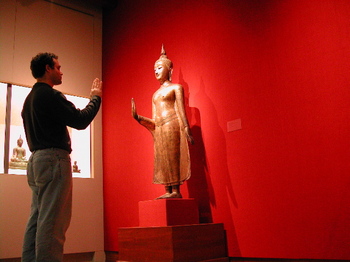Dear Readers,
It’s been nearly a month since I started writing Mindfulness Matters: Tools for Living Now, and I thought I would take a moment to say thanks to those of you who have discovered the blog and have been following it faithfully. It is my aim to offer something each day that will teach, inspire, and sustain your interest in mindfulness and living an awakened life.
So far, we’ve touched on a number of topics: forgiveness, interconnection, book reviews on women in Zen, mindfulness and the environment, mindfulness in prison, and the Buddha’s message as a manifesto for a spiritual revolution, and many more. I invite you to explore the archives.
Mindfulness is available to everyone at every moment offering a taste of being awake–fully alive right now. Mindfulness meditation practice helps us to overcome habits that get in the way of being awake right now, namely what the Buddha called the Three Poisons: greed, hatred, and delusion. Let’s take a further look at these.

Greed is greed, wanting too much, and it is also any desire that is tinged with attachment and contingency (I need this thing or something to happen in order for me to feel OK about myself and my place in the world). This covers a lot of ground and is a trap we likely fall into all the time. So, greed is greed, desire, attachment, and passion in the sense of being driven by strong emotions that may cloud our judgment. All these states generate dukkha. Hatred is hatred in its obvious and destructive forms and hatred is also aversion, a more subtle version of pushing things away. We can think of greed as a compulsive need to pull things towards us and aversion as a compulsive need to push things away. At any given moment we are pushing or pulling. This gets exhausting. Some simple reflection will reveal these processes active in any given moment–pushing and pulling, our sense of well-being yanked around by forces that seem out of our control. Delusion is not a psychotic delusion, but buying into a set of mistaken beliefs regarding the nature of experience and self. Ignorance is often used as an alternate term. What are we ignorant of? Well, the reasons why we suffer for one. We are ignorant of how pushing and pulling leads to pervasive dissatisfaction. We suffer when we are ignorant of impermanence–the constantly changing nature of things. Mindfulness practice helps us to appreciate this constant sea of change and to ride the swells and waves of changing experience. Mindfulness helps us to develop wisdom that cuts through delusion and ignorance to clear seeing of things as they are.
If you are local to Burlington, Vermont or are visiting, I invite you to meditate at the Exquisite Mind Meditation Studio. We meet Tuesday evenings at 7 PM, Wednesdays at noon, and Thursdays at 2:00. For everyone else, including those of you in Vermont, I also teach online live every Friday morning from 8:00 to 8:45 in the eMindful classroom. All these programs are offered free of charge. To login into the online meditation you will need broadband. Click here to join the Morning Meditation on eMindful.com.
I hope you are enjoying and getting value from my daily posting. Tell your friends about this blog and help to establish an online community devoted to the wisdom of mindfulness. You can subscribe to the blog by entering your email in the upper right hand panel. You’ll get an email whenever I post a new entry. If you haven’t done so already, I also invite you to read my book, Wild Chickens and Petty Tyrants: 108 Metaphors for Mindfulness. I also invite you to connect to me in social networking venues. Sign up for my monthly newsletter here:
